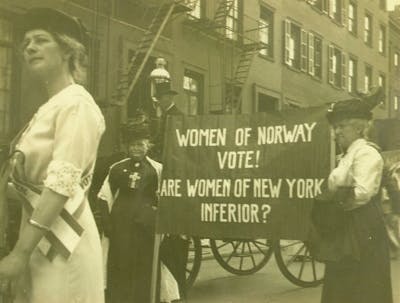5 reasons why women should live and work in Oslo
Women in Norway have the best quality of life according to the latest Women, Peace and Security Index (2019-20), and the country has important legislation protecting the rights of women. In honor of International Women's Day, these are our five best reasons why women should live and work in Oslo.

Photo: VisitOSLO/Didrick Stenersen
Reason #1: Norway is considered to be one of the most gender-equal countries in the world, especially in the workforce.
This is much thanks to the Equality and Anti-Discrimination Act. The Act's purpose is to promote gender equality, providing equal opportunities to men and women.
Another reason is the Equality and Anti-Discrimination Ombud, which was created in 2006 by the Norwegian Government with a vision of "a society where power and influence is equally distributed, freedom is available to all, and dignity is inherent to each individual."
In addition, the Norwegian Activity and reporting duty (ARP), established in 2020, is a key instrument for the integration of gender equality and a tool for gender mainstreaming in the workforce as employers are required to report on gender balance in Norwegian companies.
Norway was ranked #2 after Iceland in the World Economic Forum report Global Gender Gap Report 2020.
Photo: VisitOSLO/Thomas Johannessen

Reason #2: Female representation in Parliament and Government
Norway has a long history of female representation in politics and government. Women were granted full voting rights in 1913, and Norway became the first sovereign state in the world to introduce universal suffrage for both men and women.
The first woman in the Storting (Parliament) was Anna Rogstad in 1911, who was a deputy representative for the Liberal Left. In 1922 Karen Platou was elected as the first women to Storting. In 1981 Norway elected its first female prime minister, Gro Harlem Brundtland, and in in 1993 Kirsti Kolle Grøndahl became the first female Storting President.
Today, Norway has a female Prime Minister (Erna Solberg), female Storting President (Tone Wilhelmsen Trøen), female Foreign Minister (Ine Eriksen Søreide), as well a six other female ministers.
In the Parliamentary Election in 2018, 41.4 percent of the elected representatives were women.
In addition, four out of nine political parties have a female party leader.
Photo: Norsk Folkemuseeum/Arthur Gran

Reason #3: Norway is one of the best places in the world to raise children
Norway is ranked as the second best country in the world to raise a family, with support before, during and after birth. The country is well accommodating for women in the workforce.
In Norway, pregnancy services provided by the national health service are free of charge, there are no costs associated with giving birth in a hospital.
The total period during which parental benefit is paid in connection with birth is 49 weeks with 100 percent coverage or 59 weeks with 80 percent coverage. The parental benefit period consists of a maternal quota of 15 weeks (the first six weeks must be taken immediately following the birth), a paternal quota of 15 weeks, a period of three weeks before the due date for the mother and a joint period of 16 weeks (a total of 49 weeks).
Women are encouraged to return to the workforce, and kindergarten is offered at a low cost. Education through high school is also free for children, and public higher education is also offered at no cost.
Parents are provided with a child benefit scheme to help cover the costs of having children. A fixed amount is paid monthly until the child is 18 years old.
All of this helps to make Norway one of the best places in the world to raise children.
Photo: VisitOSLO/Preben Stene Larsen©OsloVinterpark

Reason #4: Women have opportunities in Norway
If you choose to study or work while having children, there are governmental support programs for you.
Students that have children during their studies can receive support from Lånekassen, and the college or university will offer low-cost kindergarten for their children. This parental support is often in addition to the support all parents receive.
Employers must accommodate pregnant employees and facilitate work responsibility and working hours as needed. Both mothers and fathers have access to sick days to take care of children, and employers have a duty to facilitate for parents, such a creating breastfeeding rooms, playrooms or the like, or arrange for a home office, flexible working hours or time off if needed.
Norway also has some of the highest percentages of women on boards after the country became the first in the world to pass a quota legally requiring that women represent a minimum of 40% of corporate boards in 2003. As of 2020, 42.1 percent of board representatives in public limited companies are women.
Chief Executive of Norges Bank Investment Management, Nicolai Tangen, stated in February of this year that boards where either gender has less than 30% representation should consider setting targets for gender diversity and report on progress.
Photo: VisitOslo/Kai Thon

Reason #5: The best is yet to come
- Venture Capital fund Astia, focusing on female-led companies recently decided to set up an office in Norway.
- Her Space is a co-working space in oslo where where women can work, belong and thrive
- She Conference is an annual conference in Norway with an international program working towards closing the gender gap by making businesses better.
- Female Future is a leadership development program for female talents that the company sees the potential in and wants to invest in, organized by The Confederation of Norwegian Enterprise
- Oslo Cancer Cluster shared three personal stories where women are leading the cancer research field
- Do we need female investors and founders in startups? Read more from StartupNorway
Photo: VisitOslo/Sadan Ekdemir

And many more reasons why Norway and Oslo is a great place for women.
Check out Work in Oslo region and Social Life and Culture for more info about living and working in the Oslo region.


